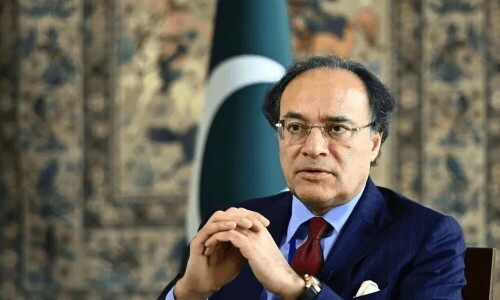Pakistan Seeks to Boost US Trade Ties Amid Tariff Concerns
Pakistan is aiming to increase its procurement of goods from the United States and eliminate non-tariff barriers to mitigate the impact of potential tariffs imposed. This was stated by Finance Minister Muhammad Aurangzeb in a recent interview.
Earlier this month, tariffs were introduced that could spark a damaging trade conflict. These measures included broad tariffs on imports globally, along with additional tariffs directed at major trade partners.
“We are considering a broader strategy for engaging with the US,” Aurangzeb commented. “We intend to engage constructively and will dispatch a formal delegation soon.”
Pakistan is interested in importing greater quantities of cotton and soybeans from the US, the finance minister noted. Discussions are underway to dismantle non-trade barriers to facilitate increased access for American products to Pakistani markets, according to reports.
“We are willing to address any concerns related to non-tariff discussions, including potentially burdensome inspections on US goods at our end,” he stated.
Reports indicate that Islamabad is endeavoring to foster goodwill with the US to potentially gain relief from the reciprocal tariffs implemented. Although these tariffs are currently suspended until July, Pakistan has announced plans to send a trade delegation to Washington in the coming months to narrow the trade deficit.
Trade Delegation to US
The US stands as Pakistan’s largest export destination, accounting for over $5 billion in annual exports as of 2024. Conversely, Pakistan’s imports from the US amount to approximately $2.1 billion.
The minister conveyed that the nation is receptive to foreign direct investments from American companies, especially in its newly accessible minerals and mining sectors.
The former banker also mentioned that the country is looking to tap into international capital markets to acquire additional funding to bolster sustainable growth.
“Our objective is to break free from the cyclical economic patterns that have historically affected Pakistan and transition towards sustained growth,” he emphasized.
Pakistan is in the process of launching its inaugural Panda bond, projected to be between $200 million and $250 million, likely to occur in the fourth quarter of this year, the minister added.
Aurangzeb also assured the International Monetary Fund (IMF) of the nation’s dedication to ongoing reforms during his meeting with IMF Managing Director Kristalina Georgieva at the IMF-World Bank Spring Meetings 2025.
Pakistani officials and the IMF team previously achieved a staff-level agreement on an Extended Fund Facility (EFF) amounting to SDR 5,320 million (approximately USD 7 billion) on July 12, 2024. This agreement subsequently received approval from the IMF’s Executive Board in late September.
Last month, the IMF and Pakistan reached an accord for a fresh $1.3 billion arrangement and concurred on the initial review of the current 37-month bailout program.



Comments (0)
No comments yet. Be the first to comment!
Leave a Comment